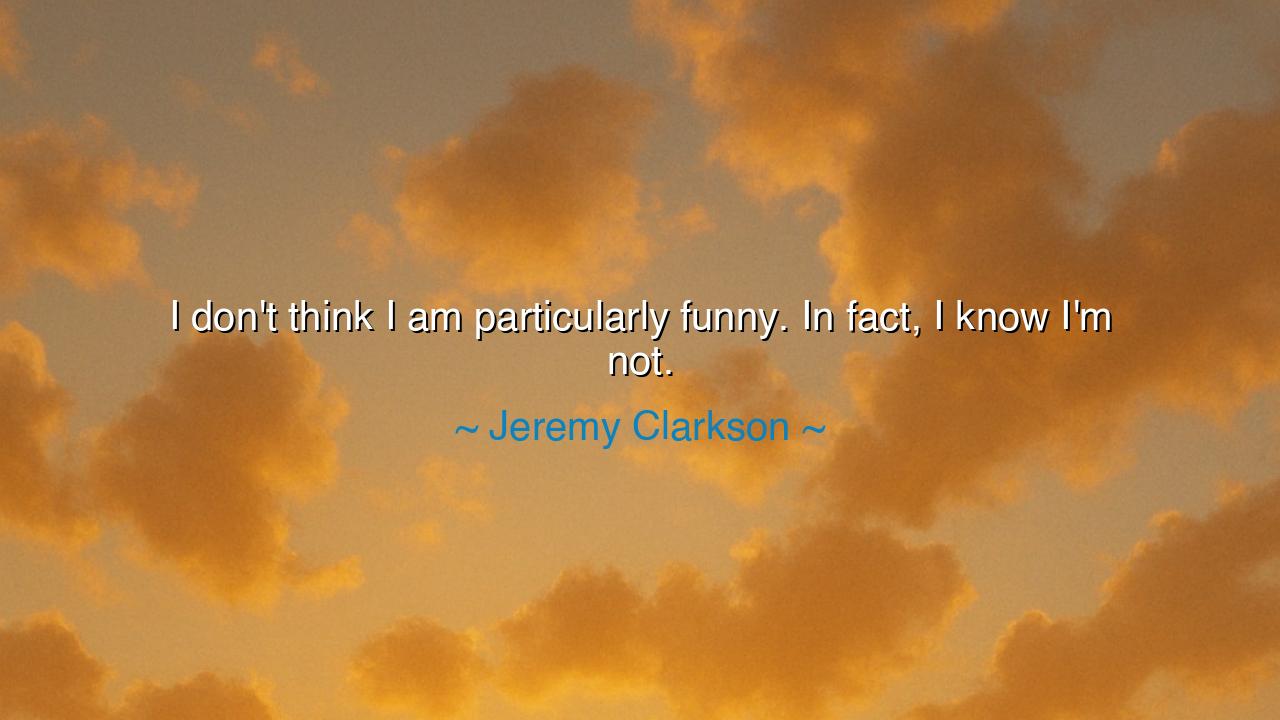
I don't think I am particularly funny. In fact, I know I'm not.






The outspoken chronicler of modern machines and human folly, Jeremy Clarkson, once said: “I don’t think I am particularly funny. In fact, I know I’m not.” To some, this sounds like self-deprecation, the false modesty of a man famous for wit. But beneath those words lies something deeper — a confession wrapped in honesty, humility, and wisdom. Clarkson, whose humor has entertained millions, here speaks not from arrogance but from awareness. He understands that true humor is not born from trying to be funny, but from speaking truth, even when that truth is uncomfortable.
When he says, “I know I’m not funny,” he is not denying his wit — he is revealing that humor, at its heart, is not an act of performance but of perspective. Comedy that endures is rarely about cleverness alone; it comes from sincerity, from seeing the absurdity in life without disguise. Clarkson has built a career not on crafting jokes but on observing reality with ruthless honesty — the stubbornness of engines, the folly of men, the irony of ambition. What makes people laugh at his words is not comedic genius, but recognition. We laugh because we see ourselves reflected in his bluntness. In that sense, his statement is a paradox — by claiming not to be funny, he reveals why he truly is.
The ancients understood this paradox well. The philosopher Diogenes of Sinope, the great cynic, was famous for his cutting humor. When Alexander the Great offered him anything he desired, Diogenes merely said, “Stand out of my sunlight.” His wit was not contrived; it flowed naturally from his disdain for vanity and power. He did not try to be funny — he was simply truthful, and truth, when spoken without fear, often sounds like comedy. Clarkson’s humor belongs to this lineage: the laughter that arises when a man refuses to play along with the polite fictions of the world. It is the humor of honesty, and honesty, though rough, has a strange beauty.
Clarkson’s statement also reflects an awareness of authenticity — the understanding that self-awareness is the root of all strength. He knows that humor cannot be forced. The moment one begins to chase laughter, it fades like smoke. True humor, like truth itself, emerges uninvited, often at the edge of frustration, irony, or absurdity. To know one’s limits, as Clarkson does, is not weakness — it is wisdom. For the fool believes himself a genius, while the wise man sees clearly his imperfections. His words, then, are not a denial of talent but a declaration of groundedness — a reminder that humility and clarity are worth more than applause.
Consider the life of Mark Twain, another man whose humor transcended jest. Twain once said, “Humor is mankind’s greatest blessing.” Yet his laughter was born of pain — poverty, loss, and the absurdities of human nature. When people praised his brilliance, Twain often dismissed it, saying he merely wrote what he saw. Like Clarkson, he understood that to be truly funny is not to invent joy, but to reveal truth. The world’s contradictions are comedy enough; the task of the humorist is simply to illuminate them. Thus, those who see clearly often appear as comedians, even when they speak in earnest.
There is also a subtle lesson in humility within Clarkson’s reflection — a virtue rare among those who live in the light of fame. To say “I know I’m not funny” is to reject the illusion of perfection. It is to recognize that laughter is not a personal triumph, but a shared moment between speaker and listener. It is the echo of connection, not the roar of self-praise. In a world obsessed with validation, Clarkson’s remark becomes a quiet act of rebellion — a refusal to measure worth by reaction. The wise man does not seek to be adored; he seeks to be understood.
The lesson, then, is simple yet profound: do not chase admiration; pursue authenticity. Speak truth, even if it is plain, even if it is not dressed in cleverness. If laughter comes, let it come naturally. Those who live honestly will find that humor follows them like a shadow — unforced, unpretentious, and deeply human. The greatest humor, like the greatest wisdom, does not shout its presence; it whispers through truth.
So, my child, remember Jeremy Clarkson’s words when you find yourself striving to impress the world. Do not try to be what you are not. Be clear, be honest, and let others laugh if they wish. For life itself is the greatest comedy, and we are all its characters — fumbling, failing, and yet somehow finding meaning in the noise. True humor is not the art of being funny, but the grace of being real. And when you live truthfully, you will discover, as Clarkson has, that even when you “know you’re not funny,” the world will still laugh — not at you, but with you — because it recognizes, in your honesty, the reflection of its own heart.






AAdministratorAdministrator
Welcome, honored guests. Please leave a comment, we will respond soon